A Grave for Two Read online
Page 6
WOMAN: How can you be so sure?
MAN: The story fits. The skis …
(PAUSE)
WOMAN: Lots of people had skis like those.
MAN (somewhat discouraged): Not at that time. Besides, I Googled it. Searched through the archives. Afterwards. After they were there. At the Ski Museum. Everything fits.
WOMAN: Does it mean anything?
MAN: You’re asking if it means anything?
WOMAN: Yes.
MAN: Of course it means something!
The WOMAN looks down at her notepad. Closes it. The MAN drinks the hot liquid. He suddenly bends down to the floor and puts down the cup. Looks around, spots a used cup on the desk. Picks it up and puts it down at the other side of his feet, in exact symmetry with the first one.
WOMAN: What does it mean, then?
MAN (obviously upset): Everything! Of course it means everything! I’ve been talking to you for nearly a year now, you have to appreciate that this is important!
WOMAN (nodding calmly as she leans back in her chair): So you say, but I’d like you to elaborate. After all these years, how can this be so significant?
MAN: Well … you see … then it wasn’t my fault.
Tram brakes screech. There is heavy traffic outside.
MAN (cont.): I feel liberated. More settled. It’s as if I’ve really succeeded at something, at last. I’ve searched for them for such a long time.
(LENGTHY PAUSE)
WOMAN: Have you really? Searched for them?
MAN: Yes, definitely. Not physically as such. That seemed so impossible. But in a way I’ve been searching. Coming to you has been a way of finding them.
WOMAN (smiling): Is that so? I wasn’t the one who showed you the photo from the Ski Museum!
MAN: No, but you’re the one who made me stronger. More aware. More certain of what I have to do now. You said it yourself: I have to distinguish between what is in my power to change, and the factors that lie beyond my control.
WOMAN (nodding): I see. What is it you now have the power to do that wasn’t possible for you to do before?
A door slams outside the office.
WOMAN (cont.): Can you give a more detailed description of what this sense of relief feels like?
The MAN sits still for a few seconds, and shrugs.
WOMAN: What has changed?
MAN: Everything. Everything has changed. Things can come into balance. Everything can be different.
WOMAN (smiling): Everything, no less. That’s good.
MAN: They’ve owned me for such a long time. Now I’m the one who owns them. The tables are turned. I call it karma.
WOMAN (distracted): That’s good.
The WOMAN looks at her watch. The MAN gets to his feet.
MAN: Yes, it’s good that everything’s going to be different now. At long last.
FRIDAY 8 DECEMBER 2017
THE LYNX
The animal was eighteen months old and at the beginning of his first whole winter without his mother and siblings. He was unusually large. His fur had been soft and reddish-brown in summer, but by late autumn it had thickened up into a greyish-white, thick coat. After loping several kilometres through pouring rain, he now merged into the winter-shrivelled landscape, almost bare of snow.
His mother had taught him that days were for rest. The evening was the lynx’s hunting time, he knew, even though he often broke the rule. He had the sight of an eagle and moved soundlessly, even in pitch darkness. And he was curious.
His mother had given him a cuff on the ear every now and again.
Whereas his two sisters were naturally shy and drew back at the least sign of danger, his urge to explore led him into more problems than his mother could countenance. By February she had chased him away. This was before she had mated again; her cub was still too young to manage by himself, and for all she knew, he might have perished before he had lost the scent of his old family.
He had not.
He had wandered south and seen many things. Fewer than sixteen hours ago, he had brought down a one-year-old roe deer in Nordmarka, beside the hill that bore his generic name. There was plenty of wild game in the forest here, and he intended to settle down. The urge to mate had started to trouble him, but something deep inside told him that must wait for another couple of months yet. The world was still too dark.
He hadn’t come across any bitches yet anyway.
That could wait.
Pedestrians were the only things that bothered him about his newly established territory. Even deep within the forest, where the tracks were narrowest, the paths criss-crossed the terrain and human beings used them constantly. Down here, beside the biggest track of them all, he had never ventured. He stood between the spruce trunks, a safe distance from the road, where he saw a car drive past. The engine noise made him draw back, but not far. He was a courageous lynx, and when it grew quiet, almost completely silent, he dared to move out again.
He spotted prey in the stream.
A human, he realized when he caught the scent on the light breeze from the west. No more of those noisy machines came along, and after a few minutes he padded quietly down to the stream bed, exactly where it disappeared into a concrete pipe beneath the road that bisected Maridalen lengthwise.
It smelled dead. The blood, however, still tasted fresh when the lynx lapped it up, just below the dead man’s hard skull. The carcase was lying on its stomach, with its face in the water. The scent of blood burned his nostrils, but most of all the rank smell of human being.
The lynx was still replete after the prey he had felled and eaten before daybreak. Besides, he preferred to kill his own meat.
Carcases were emergency rations.
He slurped down even more blood. Lingered for a few seconds in front of the dead human’s feet as he sniffed inquisitively at the peculiar sticks attached to each of them. The lynx snatched at one of these, but it was stuck fast and didn’t taste good. When a little wheel began to spin, even the most courageous of lynxes was startled.
The rain was still pouring down, swelling the stream.
The lynx withdrew into the forest at the top of the road.
He disappeared into the moss between the wet trees and never looked back.
THE MESSAGE
‘You can’t mean that, Selma.’
Vanja Vegge stared indignantly at her over her red wine glass with a stem so long and slim that Selma feared Vanja’s rage would cause it to break.
‘That would be a conspicuous breach of professional ethics!’
She stopped the glass on its way to her mouth and put it down again as she shook her head.
‘In the first place I wouldn’t be able to take you on as a patient no matter how much you needed it. You don’t treat your closest friends, Selma. Secondly, anyway, I can’t possibly issue any declaration that you’re receiving treatment from me if that has no basis in reality! What’s more, there isn’t anything wrong with you. What would you need me for? Other than as a friend? Have you gone …’
Selma took a deep breath and let the air ooze out through puffed cheeks.
‘Fine. Forget it.’
She grabbed the Pepsi Max glass and drained it in one. Her restlessness made her twirl the empty glass on the table. Didn’t want to, but had to. Put it down with a bang.
‘Fabulous food. Thanks a million. I have to think of leaving now.’
Vanja Vegge put her hand, rattling with five bracelets and huge rings on all her fingers, on top of Selma’s.
‘What’s going on with you? What’s actually happened?’
Selma pulled her arm away and camouflaged the dismissive gesture by picking up the napkin and wiping her mouth.
‘Nothing.’
‘Nothing? I’ve been trying to get hold of you for a week! Your office says you’ve left. Left! Sure enough, your secretary gave me the run-around, but in the end it seemed as if she was saying that you’re ill. Seriously ill, Selma! Is that true? You don’t look even the slightest
ill to me, but it’s …’
‘I’m not ill, Vanja. I’d be grateful if you could spread that news. It’s all due to a misunderstanding, OK?’
‘That’s great, then! But all the same … Jesso is grumpy and won’t say anything at all. I’ve tried to contact Anine for three days now, but all your only daughter has said by way of reply is a text message asking me to tell you to go to hell if I find you. What …’
Selma put down her knife and fork.
Don’t think of Anine. Nor of Johannes. Don’t think about your children.
‘Selma, you’re crying!’
Vanja’s voice dropped a notch and her words came more slowly.
‘You can’t cry, Selma. That should be physiologically impossible. What’s happened?’
‘Nothing. Absolutely nothing. I’m not actually crying. Look!’
She leaned forward and opened her eyes wide. Vanja mumbled something inaudible. Selma forced a smile and blinked quickly.
‘There really are no tears. Just a bit moist, which is fine.’
‘Why have you moved out? The only thing Jesso would tell me was that you’re no longer living on Ormøya. Where are you living, then? It was fine for us not to talk about this while we were eating, but now I really must insist that …’
The doorbell rang.
Hesitating, Vanja looked in irritation at the clock.
‘Wait a minute,’ she commanded as she got to her feet. ‘Don’t go.’
Selma did not go. She was in no fit state to leave. She was hardly able to do anything at all. She’d been at Vanja’s for more than two hours now without talking to her. Of course, she had chatted nineteen to the dozen. Selma Falck was good at small talk, best of them all; she had prattled her way through a long and extraordinarily successful life. On the other hand, she could barely recall the last time she had talked to anyone. About what should really be talked about, but for which there were no words. The situation had forced out of her bits and pieces of the story about everything that had led her here. It had been impossible to avoid. Jesso had to know something of the truth, of course; she had practically hounded her husband into losing everything and owed him some sort of explanation. The children, too, the nineteen-year-old who still lived at home to some extent and the twenty-three-year-old daughter who was studying law and planned to marry next summer. Selma had revealed very little to her husband and children, a tiny scrap of the true story, hardly anything at all, but enough to have Selma disinvited on the spot from Anine’s forthcoming sumptuous wedding.
Stop. Don’t think about them. Not about the children.
‘You have friends, Selma. Unbelievably many friends who wish you well.’
Vanja’s voice drifted through from the hallway as she apparently fumbled with the lock.
‘And I’m the best of them all. Now we’re going to have a heart-to-heart. We’ve the whole night ahead of us. I’m not letting you leave!’
Selma shut her eyes.
Took a deep breath, and tried to make her face resume its usual contours. She wanted to be her usual self. The competent, glib, popular Selma Falck that everyone knew, and who had been selected as the country’s best dressed woman as recently as 2015. Now she could smell her own body odour. Only faintly, and partially camouflaged by the Penhaligon’s perfume and an ancient hoodie with NORWAY emblazoned on the back, but noticeable all the same. The bathroom in her temporary apartment was, if possible, even more repellent than the living room, and she hadn’t showered for the past two days.
She knew of a poker group in Ensjø. They usually began around midnight.
She had to go.
She stood up unsteadily, with both palms resting on the table. With her feet planted well apart, without shoes, she saw now that she was wearing one black and one grey sock, and she had shot up from her chair when she heard Vanja scream.
At first she did not understand what it was. The sound was so unfamiliar and unexpected that her brain needed a few seconds to confirm that it was a human scream she had heard. Then the sound had to be placed in context: it came from the hallway in Vanja and Kristina’s excessively colourful apartment.
From Vanja’s throat.
Selma broke into a run.
‘What’s up?’ she said when she came to a sudden halt in the doorway of the long, narrow hallway.
Two men.
One was from the police, an older guy in uniform. An inspector, Selma could tell from the stripes on his shoulder. Experienced, she saw from the appropriately mournful face and the hefty hand on Vanja’s shoulder. The other man was far younger. He was wearing a dark suit and clerical collar. His glasses were threatening to slide off his small snub nose.
‘Is that you?’ the pastor blurted out. ‘Selma Falck?’
The policeman’s eyes darkened.
‘Unfortunately, there’s been an accident,’ he said quietly. ‘Is Kristina Holm here?’
Vanja tore herself loose from the inspector’s grasp.
She had started to howl.
‘No,’ Selma said, approaching Vanja with purposeful steps. ‘Kristina’s in Tromsø this weekend. What has happened?’
The howl became a shriek. Selma only just managed to catch hold of her friend as she began to fall. The wail grew gradually weaker and higher, like a band saw as it became hot.
The pastor seemed alarmed and pressed himself against the wall.
‘We asked to come in,’ he bleated. ‘It wasn’t our intention to talk about this out here in the hallway. Maybe we should sit down and … She just knew!’
Selma looked at the police officer. The police officer looked at Selma. His pale-blue eyes were as old as the hills, with a greyish film behind one pupil.
‘There’s been an accident,’ he said again. ‘I’m sorry to tell you that Haakon Holm-Vegge is dead.’
Vanja fainted, but Selma held her tightly and would never let go.
THE TIP-OFF
It was only by a whisker that the young journalist – newly appointed to a six-month temporary post in the Dagens Gang newspaper’s sports section – even checked the text message on his mobile when it buzzed. The woman he had brought home from the city centre around eleven p.m. was already naked, and he himself was only in a sweater. Things were going well.
‘Wait a minute,’ he panted, reaching out towards the coffee table.
‘Forget that for now,’ she groaned, pulling him towards her with a firm grip on his buttocks.
The temptation was irresistible.
‘Two seconds,’ he said nevertheless. ‘Just two seconds.’
One minute later he was heading out the door.
And almost fully dressed.
SATURDAY 9 DECEMBER 2017
THE PRESS CONFERENCE
Selma quickly realized she shouldn’t have come.
Despite not being a journalist, of which everyone was well aware, she had been able to enter without difficulty one of the biggest conference rooms in the Norwegian Cross-Country Skiing Federation’s glass palace below the Holmenkollen national ski complex. The room, named the Dæhlie auditorium after the famous cross-country skier, Bjørn Dæhlie, had windows facing north-west. A December storm had roared in from that direction several hours earlier. The vast glass panes were now monochrome grey and dripping wet, and they were visibly moving with each powerful gust of wind. As more journalists kept swarming into the room, a young woman in an overly tight skirt struggled to make the mechanical curtains work.
Without success.
As soon as Selma sat down in one of the furthest-back seats, a microphone was thrust into her face.
‘Dagbladet here! Who do you represent, Selma Falck? What’s the reason for …’
She pushed the microphone carefully away.
The night had lasted a lifetime, and she had not slept.
The pastor had disappeared from Vanja’s apartment when Selma asked him to. The police inspector had stayed until he had contacted a doctor. The doctor had arrived, talked to Selma in hushed tones, l
eft three pills in a small envelope and then left with the policeman.
Only Selma had stayed until morning came.
At ten a.m., Kristina had landed at Gardermoen airport, just in time before the entire airport was closed because of the bad weather. She was chalk white and red-eyed, with a shapeless mouth distorted by crying. During the night, in quiet spells while Vanja dozed, Selma had contacted their closest friends. Two of them had booked plane tickets, met Kristina at the airport and brought her home. In the meantime, several of them had silently set up camp in their apartment. Most of them old teammates, and they had come for the long haul. Selma could finally leave.
Only after 2,000 metres in the swimming pool at the Tøyen Baths had she felt somewhat restored. She had gone home and picked up some clothes from the only box Darius hadn’t yet peed into, and felt presentable for the first time in ages.
‘Selma Falck,’ whispered a middle-aged man in jeans and an orange padded waistcoat.
He had assumed a sympathetic expression, but nevertheless failed to disguise his curiosity.
‘Condolences. Truly. Haakon was your godson, wasn’t he?’
Selma didn’t want to answer. But Selma Falck always gave an answer.
‘Yes,’ she said softly. ‘And thank you.’
She really shouldn’t have come.
Vanja became Selma’s friend on Monday 20 August 1973. In the photograph of the new Primary One class, they both had red satchels with white seams. Pigtails. And each with a ball under her arm, which the teacher hadn’t discovered until after the photo had been taken. Selma had defiantly got her own way and was wearing trousers. Vanja was dressed in a skirt and white lacy blouse, and they were placed side by side in the classroom to remain seated like that for ever afterwards. No matter what the teacher said. Many years later they both ended up in the national team, and Vanja would find Kristina. Selma met Jesso and got married, something Kristina and Vanja were unable to do until times changed when Haakon was three years old.

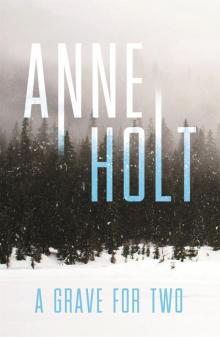 A Grave for Two
A Grave for Two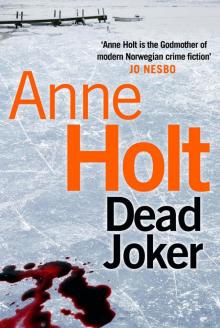 Dead Joker
Dead Joker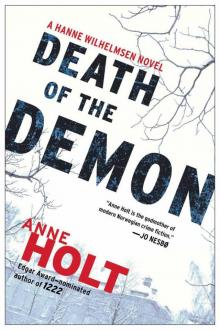 Death of the Demon: A Hanne Wilhelmsen Novel
Death of the Demon: A Hanne Wilhelmsen Novel Punishment aka What Is Mine
Punishment aka What Is Mine Beyond the Truth
Beyond the Truth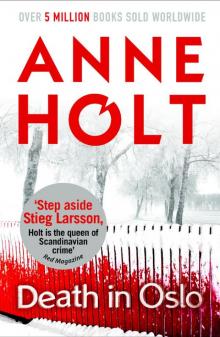 Death in Oslo
Death in Oslo The Blind Goddess
The Blind Goddess What Never Happens
What Never Happens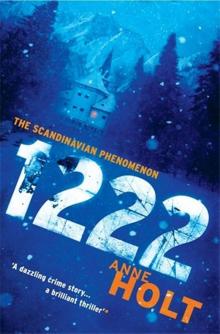 1222
1222 In Dust and Ashes
In Dust and Ashes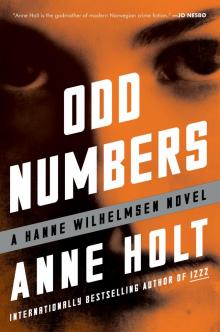 Odd Numbers
Odd Numbers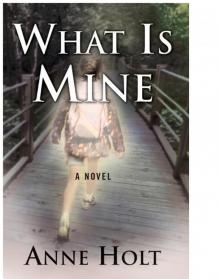 What is Mine
What is Mine What Dark Clouds Hide
What Dark Clouds Hide Blessed Are Those Who Thirst
Blessed Are Those Who Thirst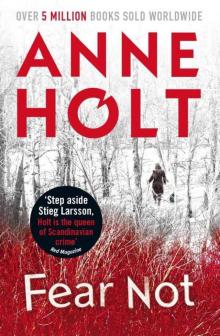 Fear Not
Fear Not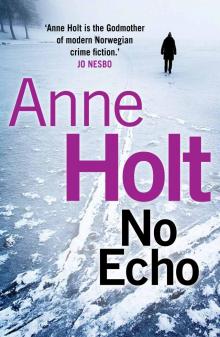 No Echo
No Echo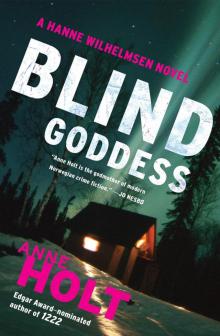 Hanne Wilhelmsen - 01 - The Blind Goddess
Hanne Wilhelmsen - 01 - The Blind Goddess